
by Gideon Marcus
Hello, Louie!
Enough talk about Cambodia, Israel, and the Race Problem. How about some happy news for a change?
Satchmo, sometimes known as Louis Armstrong, had a birthday this last Independence Day. The famed trumpter and gravel-throated crooner, known for his ear-splitting smile and breaking racial barriers, has just finished his seventh decade.
"It's awful nice to be breathing on your 70th birthday, let alone feeling in the pink," he observed.

A big tribute was held in Los Angeles' Shrine Auditorium for Armstrong on July 3rd, perhaps the most influential jazz musician since the genre was born. While he did not puff his cheeks to blow his horn (he is still recovering from a kidney infection), he did sing for his audience, joined by a number of fellow jazz greats. Proceeds from the event will go to the Louis Armstrong Statue Fund.
So, happy birthday to New Orleans' favorite son. What a wonderful world.
Hello, Jimmy!
As Galaxy approaches its 20th birthday, I see it has reverted to the format the magazine took back in 1958: it is once again an overlarge bi-monthly (like sister mag IF, which means we essentially get three mags every two months). On the one hand, this makes room for bigger pieces, like the superlative story that headlines this month's issue. On the other hand, it means more room for dross like Heinlein's new serial that taillines the book.
Read on. You'll be grateful I did the screening for you…
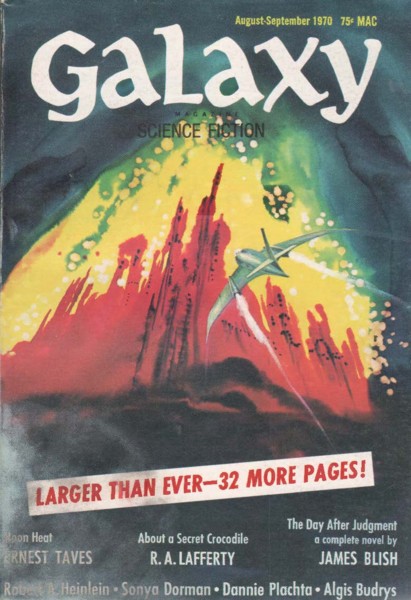
Cover by Jack Gaughan
The Day After Judgment (Complete Novel), by James Blish
Armageddon is here. The nuclear arsenals of the world have been unleashed, reducing most of Earth's cities to ashes. In the heart of Death Valley, the infernal city of Dis has arisen, red hot iron surmounted by dancing demons. Baphomet has appeared before the 'Holy See', announcing that God is dead.
Judgment Day has come, and the demons seem to be the victors.
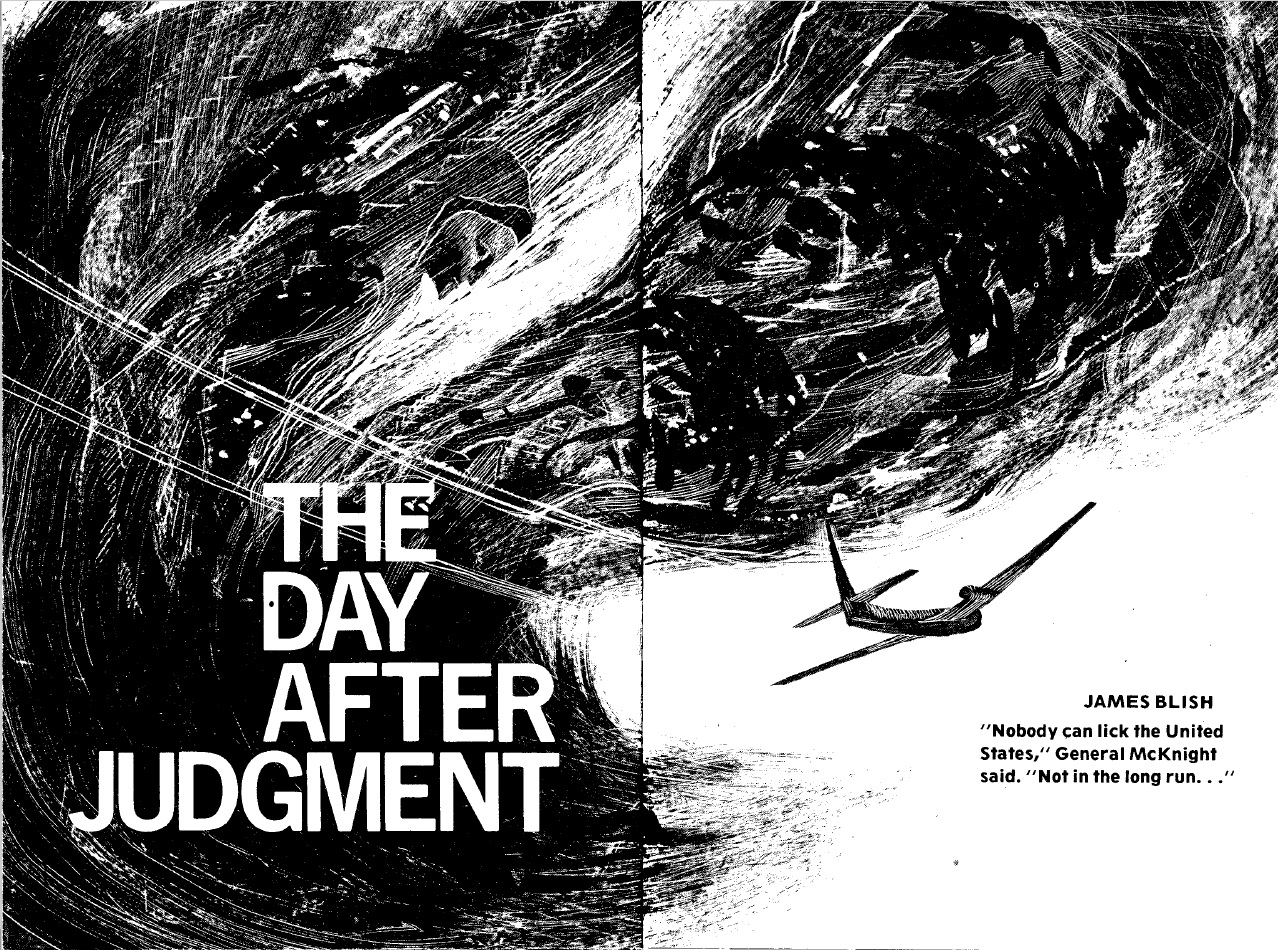
A few survivors hold out hope, however. They include Father Domenico, a white magician who wonders if his power can tilt the balance toward the Lord; Theron Ware, a demonologist who summoned 48 demons from Hell, triggering the End Times, contemplating a negotiation with the Prince of Lies; Baines, an arms merchant who contracted Ware, putting his faith in secular technology to save him; Ginsburg, a Don Juan apprentice in the magical arts of seduction—mostly just along for the ride; and General McKnight, head of Strategic Air Command, who believes that the United States military might have the power to dislodge the demonic invasion.
The story's conclusion is in doubt all the way to the end, but when it comes, perhaps it's what one might have expected all along.
Blish has written a moving, eminently satisfying piece of Christian mythology, efficiently portraying the salient, disparate viewpoints of humanity in the face of Eschatos. Philosophically fascinating, encyclopedic in its compass of the forces of Hell, and insightful in its portrayal of humanity, it is also a cracking good read (save for the typographical issues that caused a few sentences to be omitted/eviscerated).
Possibly my favorite story of the year. Five stars.
(I have just learned that this is a sequel—really, the other half—of Faust Aleph-Null, a story David Levinson said ended too abruptly. This explains why. I wonder if Blish will combine the two and release them as a novel. By the way, this installment also has a few "Tuckerisms". For instance, Fr. Boucher and Fr. Vance, in addition to the Fr. Anson that David mentioned last time. Beyond that, however, this installment, at least, is played more-or-less straight, if occasionally with excessive histrionics.)
About a Secret Crocodile, by R. A. Lafferty

There are countless secret societies in the world, Lafferty asserts, each with their own domain of control. But all of them are in service to The Crocodile, the secret organization that controls them all. ABNC is "the Mouth of the Crocodile", a mass media enterprise that comprises the propaganda arm for this cabal. For decades, they have ensured that their message sways thoughts and actions across the globe.
But now appears a new factor, a trio whose powers are so strong that they neuter every word of the Mouth, and worse, cause them to backfire. Moreover, the three aren't even aware that they are doing it! Something must be done, or the sinister intentions of the Crocodile will come to naught.
Lafferty generally ranges from whimsically tinged but basically rational storytelling to rationally tinged but basically whimsical storytelling. This piece falls in the latter category, and as I often find the case with Lafferty, it tries to be too clever by half. Too much frivolity makes a piece…well… frivolous.
A high two stars, I guess.
Coordinates, by Sonya Dorman
A cute set of acrostic poems using science-ish terms like "NASA", "LASER", and "QUASAR" as guides.
Three stars.
Power Play, by Dannie Plachta
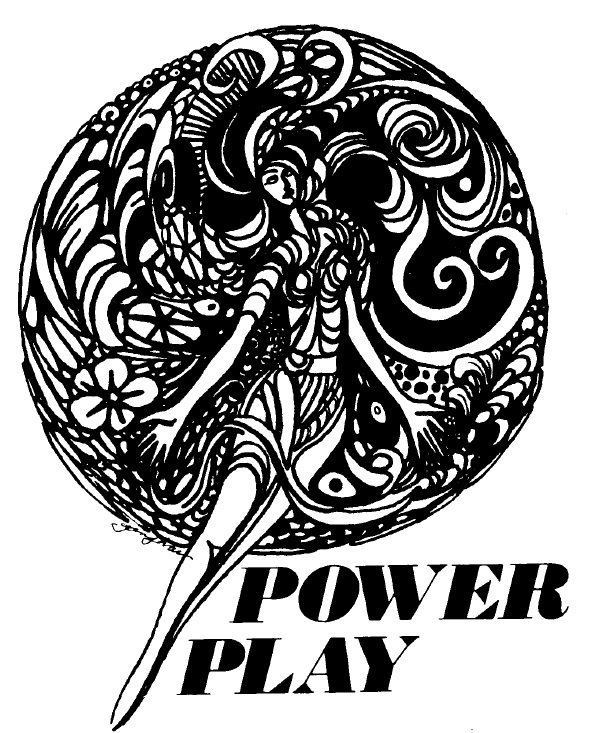
A woman purports to be able to spin an umbrella in a pot with just her mind. The umbrella claims the same skill in reverse.
Pointless. Two stars.
Moon Heat, by Ernest Taves
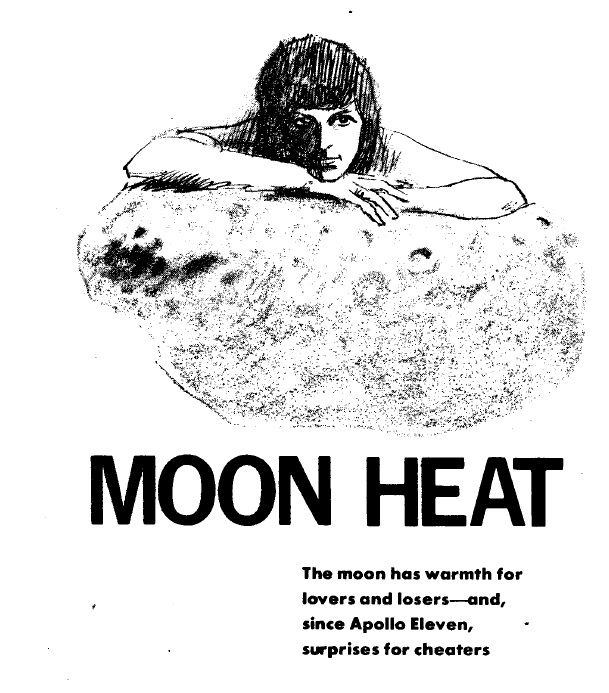
A skilled but penniless prestidigator schemes to steal and fence a genuine Apollo 11 Moon rock. His aim is to use the proceeds to woo his put-upon girlfriend. He ends up with more than he bargained for when the rock's original owner shows up.
It's fun, the sort of piece which might have shown up in Galaxy's abortive, fantasy-themed mag, Beyond back in the early '50s.
Three stars.
I Will Fear No Evil (Part 2 of 4), by Robert A. Heinlein
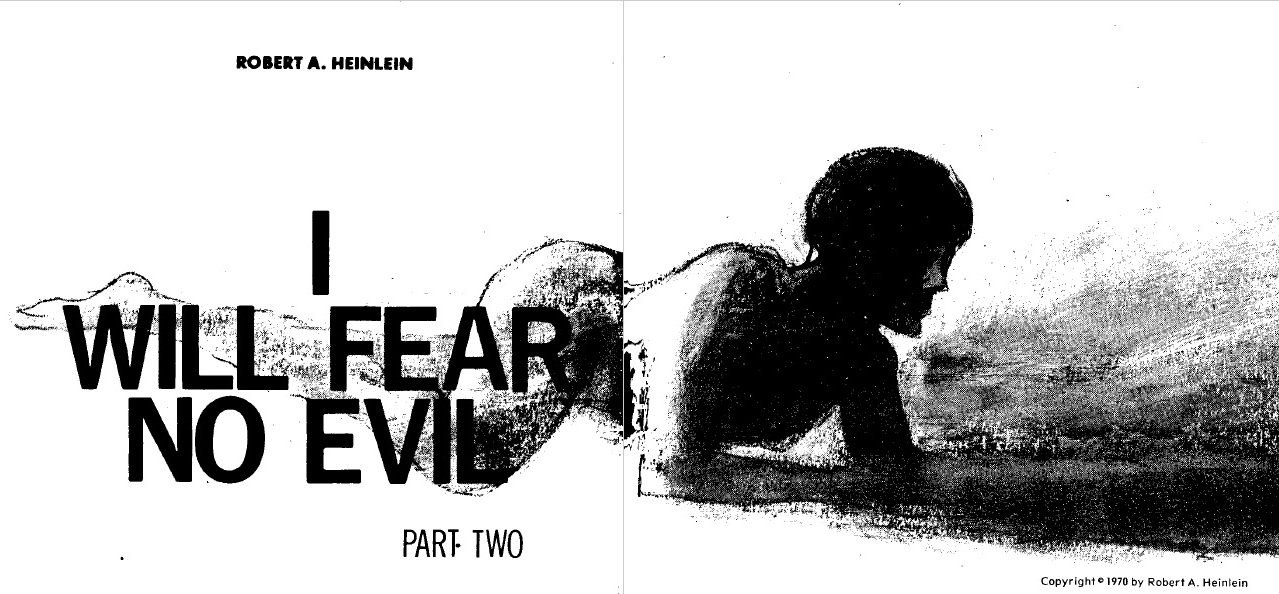
Today, I learned that Robert Heinlein can type with just one hand.
I won't bore you with the details of this second installment of the (former) Dean of Science Fiction's latest book. Suffice it to say that Eunice and Johann (now going by Jo-an) continue to talk dirty to each other within the confines of their own skull, an endless parade of unpunctuated parenthetical statements. Johann begins to feel all girly because he's got a girl's plumbing, and because of Eunice's influence. S/he makes out with his/her nurse and his/her attorney. There is a pending trial to determine if the entity that calls itself Joan Eunice Smith is really Johann Sebastian Bach Smith or Eunice Branca.
That's what you get for your 85 pages. Or about 30 cents of the 75 center cover price. Aren't you happy?
There could be a story, I suppose, about a man's brain in a woman's body, and the inevitable (and controversial) discussion of nature vs. nurture in the exploration of sex and gender relations. By having Eunice inexplicably part of the duo-mind, the experiment is hopelessly tainted.
One star.
Galaxy Bookshelf, by Algis Budrys

Budrys is cranky today, lambasting a pair of collections not for their contents but for the laziness of the editors who put together each story's introductory blurb. The first is 14 Great Tales of ESP with, of course, an intro by John Campbell. The second is Infinity One, of which Budrys says the stories therein are of "generally high quality". This contrasts with Brian's assessment, which was more negative.
Hello, Alka-Seltzer!
How do I begin to rate a magazine that contains such zeniths and nadirs? I suppose if you pretend the Heinlein doesn't exist, you still get close to a full magazine, and that Blish is worth the cover price alone. I just miss the old days, when Willy Ley was contributing science articles, women wrote more stories, and the quality was superlative from front to back.
I wouldn't go back to 1950 for anything, but I do pine for Galaxy's better days. Well, maybe it'll get better. I'm sure ol' Satchmo had his rough patches, too…
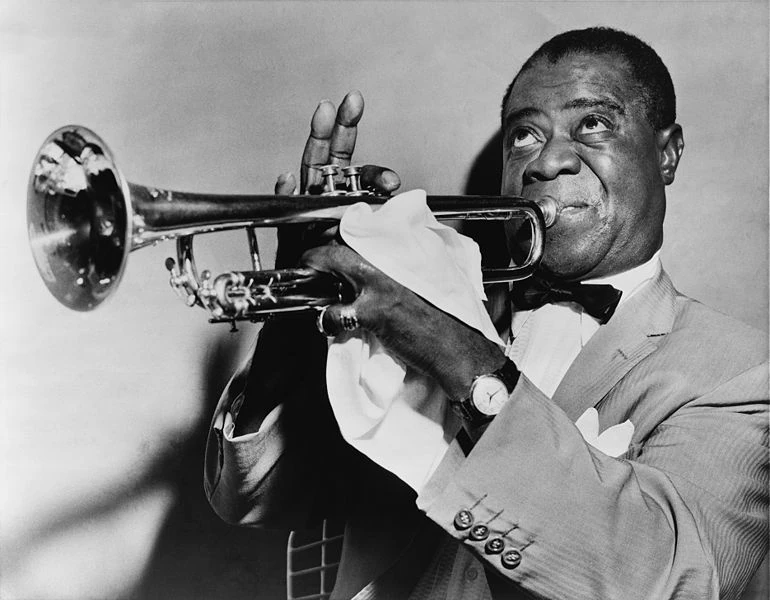
[New to the Journey? Read this for a brief introduction!]

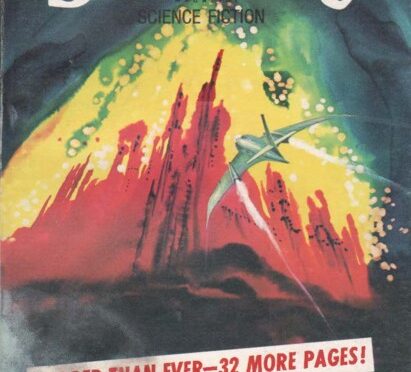


While the Blish certainly redeems "Faust Aleph-Null," I can't get five stars out of it. Maybe that's because I'm tainted by the memory of the prior novel, maybe because I think the ending looks more profound than it actually is, or maybe because I'm a cynical old curmudgeon. I'd give it a four, and it probably drags the whole thing up to a high three. The first half, two-thirds, whatever is still full of fluff and bits that don't contribute to the overall narrative. Also, Ginsberg is utterly unsuited to his final line.
Lafferty, on the other hand, is a high four for me. There's almost too much story for good Lafferty, but he pulls it off. This is probably the author whose work we're farthest apart on over the years.
For the rest of the issue, we're more in line. Plachta, as usual, turns out a piece about which the nicest thing I can say is that it's short. His stuff keeps selling, but I don't know anyone who has liked any of it.
"Moon Heat" was fine, though a little old-fashioned. A month from now, I won't remember anything about it, but there's nothing wrong with it.
The Heinlein thing? In one very narrow sense, it's slightly better than the first part. That's because bits of it have that "make the reader turn the pages" aspect that was entirely missing from the first installment. Other than that, it has no redeemable qualities. I also have the feeling that I know more about the Heinleins private life than I want to.
I had the advantage of starting past all the bad stuff in the Blish. The Lafferty, I felt like Sheckley could have done it better.
Great story on Mr. Armstrong, possibly the single most important musician in American history, full stop. One thing you should know, if you called him "Louie" to his face, he would let you know that his name should be pronounced "Louis" instead. He considers himself to be part of the Black community of New Orleans, rather than the French Creole community, where Louie would be the more popular pronunciation.